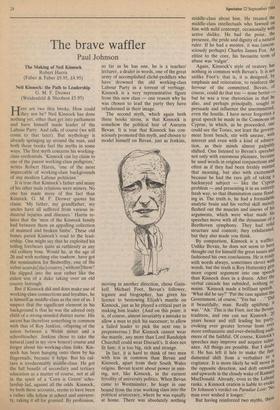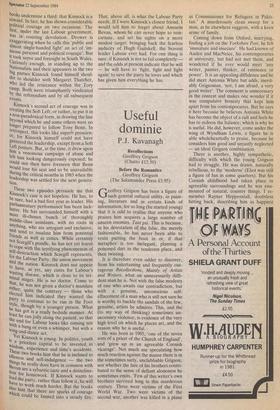The brave waffler
Paul Johnson
The Making of Neil Kinnock Robert Harris (Faber & Faber £9.95, £4.95)
Neil Kinnock: the Path to Leadership G. M. F. Drower (Weidenfeld & Nicolson £5.95) Here are two thin books. How could they not be? Neil Kinnock has done nothing yet, other than get into parliament and have himself made leader of the Labour Party. And talk' of course (we will come to that later). But mythology is already springing up around the man, and both these books fuel the myths in some ways. The first myth concerns his working- class credentials. `Kinnock can lay claim to one of the purest working-class pedigrees,' writes Robert Harris, 'one of the most impeccable of working-class backgrounds of any modern Labour politician.'
It is true that Kinnock's father and many of his other male relations were miners. No one has made more of this fact than Kinnock. G. M. F. Drower quotes his claim: 'My father, my grandfather, my uncles have all suffered from various in- dustrial injuries and diseases.' Harris re- lates that the 'men of the Kinnock family had between them an appalling collection of maimed and broken limbs'. These old bones paved Kinnock's road to the lead- ership. One might say that he exploited his toiling forebears quite as ruthlessly as any old colliery boss. Would he, at the age of 26 and with nothing else toishow, have got the nomination for Bedwellty, one of the safest seats lin ! the country without them? He slipped into the seat rather like the eldest son of a duke taking over an old county borough.
But if Kinnock did and does make use of working-class connections and loyalties, he is himself as middle-class as the rest of us. I suspect that the significant element in his background is that he was the adored only child of a strong-minded district nurse. His ascent has therefore something in common with that of Roy Jenkins, offspring of the union between a Welsh miner and a schoolteacher. Jenkins chose to take the natural (and in my view honest) course and forget about his working-class links. Kin- nock has been hanging onto them by his fingernails, because it helps. But his cul- ture is irredeemably middle-class. He got the full benefit of secondary and tertiary education as a matter of course, not at all in the spirit of a 'Corn is Green' scho- larship lad, against all the odds. Kinnock, by both these accounts, seems to have been a rather idle fellow at school and universi- ty, taking it all for granted. By profession, so far as he has one, he is a teacher/ lecturer, a dealer in words, one of the great army of accomplished cliché-peddlers who have drowned the old working-class Labour Party in a torrent of verbiage. Kinnock is a very representative figure from this new class — one reason why he was chosen to lead the party they have refashioned in their image.
The second myth, which again both these books stress, is that Kinnock is somehow the political heir of Aneurin Bevan. It is true that Kinnock has con- sciously promoted this myth, and chosen to model himself on Bevan, just as Jenkins, moving in another direction, chose Gaits- kell. Michael Foot, Bevan's follower, legatee and biographer, has given his licence to bestowing Elijah's mantle on Kinnock, just as he played a critical part in making him leader. (And on this point: it is, of course, almost invariably a mistake to allow a man to pick his successor; to allow a failed leader to pick the next one is preposterous.) But Kinnock cannot wear the mantle, any more than Lord Randolph Churchill could wear Disraeli's. It does not fit him; it is too big, rich and strange.
In fact, it is hard to think of two men with less in common than Bevan and Kinnock, apart from their South Wales origins. Bevan learnt about power in min- ing, not, like Kinnock, in the earnest frivolity of university politics. When Bevan came to Westminster, he leapt in one bound from the true working class into the political aristocracy, where he was equally at home. There was absolutely nothing
middle-class about him. He treated the middle-class intellectuals who fawned on him with mild contempt, occasionally with active dislike. He had the poise, the presence, the pride and dignity of a natural ruler. If he had a mentor, it was (uncon- sciously perhaps) Charles James Fox. An elitist to the core, his favourite term of abuse was 'vulgar'. Again, Kinnock's style of oratory has nothing in common with Bevan's. It is not unlike Foot's: that is, it is designed, by emphasis and reiteration, to reinforce the fervour of the committed. Bevan, of course, could do that too — none better ---- but he was a true rhetorician in that lre also, and perhaps principally, sought to persuade and influence the uncommitted, even the hostile. I have never forgotten a great speech he made in the Commons on Cyprus, in which, as he proceeded, one could see the Tories, not least the govern- ment front bench, stir with unease, with interest and even with a kind of admira- tion, as their minds almost palpably shifted. One listened to Bevan's speeches not only with enormous pleasure, because he used words in original conjunctions and often as if they had been freshly minted that morning, but also with excitement because he had the rare gift of taking a hackneyed subject — like the Cyprus problem — and presenting it in an entirely fresh way, so that illumination came flood- ing in. The truth is, he had a formidable analytic brain and his verbal skill merely fleshed out the muscles and sinews of his arguments, which were what made his speeches move with all the dynamism of a Beethoven symphony. They had solid structure and content; they exhilarated, but they also made you think. By comparison, Kinnock is a waffler. Unlike Bevan, he does not seem to have, thought out for himself the great issues and fashioned his own conclusions. He is readY with words always, sometimes clever with words, but the truth is Roy Hattersleyeg tS more cogent argument into one speech than Kinnock does in a dozen. After the verbal cascade has subsided, nothing re; mains. 'Kinnock made a brilliant speech. `What did he say?' Put the case against the Government, of course,' Yes but . 1)1.d. it beautifully, man. Really uplifting, u was.' Ah.' This is the Foot, not the Bevan, tradition, and one can see Kinnock. 2. years hence and still leading his party, evoking ever greater fervour from eve( more enthusiastic and ever-dwindling audi- ences of the faithful. Of course, Kinnock '5 speeches may improve and acquire subst- ance. All things are possible. But I doubt it. He has left it late to make the fun- damental shift from a verbaliser to .3 cogitator. It is more likely he will move in the opposite direction, and drift onwards and upwards in the cloudy wake of Ramsey MacDonald. Already, even in the Labour ranks, a Kinnock oration is liable to evoke Dr Johnson's verdict on Paradise Lost: `No man ever wished it longer.'
But having reinforced two myths, these books undermine a third: that Kinnock is a coward. In fact, he has shown considerable political courage on two occasions. The first, under the last Labour government, was in resisting devolution. Drower is exaggerating when he calls this 'public and almost single-handed fight' an act of 'im- mense personal and political courage'. But It took nerve and foresight in South Wales. Curiously enough, in standing up to the Nationalists and their appeasers in the two big parties Kinnock found himself shoul- der to shoulder with Margaret Thatcher, who led the resistance within the Tory camp. Both were triumphantly vindicated by the referendum and by all subsequent events.
Kinnock's second act of courage was in creating the Soft Left; or rather, to put it in a non-paradoxical form, in drawing the line beyond which he and some others were no longer prepared to follow Tony Benn. In retrospect, this looks like superb prescien- ce, for Kinnock himself could not have garnered the leadership, except from a Soft Left posture. But, at the time, it drew upon him a venomous campaign of abuse and left him looking dangerously exposed; he Could not then have foreseen that Benn would lose his seat and so be unavailable during the critical months in 1983 when the
leadership was settled for the next genera- tion.
These two episodes persuade me that Kinnock's case is not hopeless. He has, to be sure, had a bad first year as leader. His parliamentary performance has been lack- lustre. He has surrounded himself with a Most ill-chosen bunch of thoroughly middle-class assistants, with no roots in anything, who are arrogant and exclusive, and tend to insulate him from potential friends as well as critics. While certainly not Scargill's poodle, he has not yet learnt to cope with the terrifying phenomenon of self-destruction which Scargill represents, for the Labour Party, the union movement and the nation. Kinnock does not appear to have, as yet, any cures for Labour's wasting disease, which is close to its ter- minal stages. He is no doctor. Come to that, he was not given a doctor's mandate either; quite the contrary — those who elected him indicated they wanted the Party to continue to be run in the Foot style, though by a younger person. What he has got is a ready bedside manner. At least he can jolly along the patient, so that the end for Labour looks like coming not with a bang or even a whimper, but with a song-and-dance act. Yet Kinnock is young. In politics, youth is a priceless capital to be invested in wisdom, experience and time's accidents. These two books hint that he is inclined to Idleness and self-indulgence — the two things he really does have in common with Bevan are a sybaritic taste and a disincline- !ion for homework. If Kinnock wants to lead the party, rather than follow it, he will have to work much harder. But the books also hint that there are sparks of courage Which could be fanned into a steady fire.
That, above all, is what the Labour Party needs. If I were Kinnock's closest friend, I would tell him to forget about Aneurin Bevan, whom he can never hope to rein- carnate, and set his sights on a more modest target: bringing back the fearless audacity of Hugh Gaitskell, the bravest leader Labour ever had. For one thing is sure: if Kinnock is not to fail completely and the odds at present indicate that he will — he will have to 'fight, fight and fight again' to save the party he loves and which has given him everything he has.











































 Previous page
Previous page